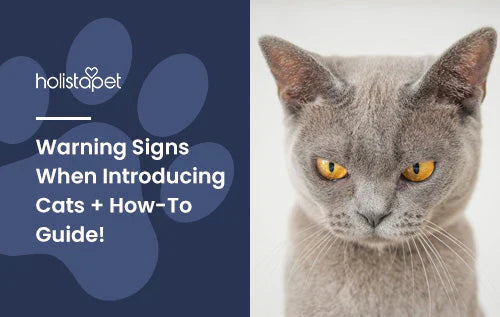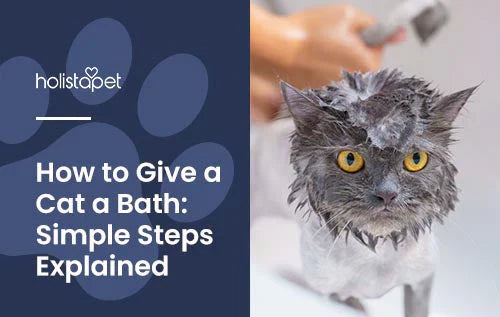Cats are quirky little animals. If you're a cat owner, you likely already know that they naturally are most active during dusk and dawn. Their weird sleeping tendencies even have them running around through the night! But is there any way to help your cat calm down when the sun sets? You may be wondering, "Can I give my cat melatonin?"
While melatonin may seem like an ideal solution for a cat that struggles with insomnia or restless sleep, there are some important factors to consider before giving it to your feline friend. This article will look at the potential benefits and risks of using melatonin in cats and explore alternative options for improving your cat's sleep quality. Let's jump in together!
What Is Melatonin?
Melatonin is a natural hormone that your brain produces in response to changes in light exposure. It plays an important part in regulating sleep patterns and wake cycles and can help to promote restful sleep in humans and animals.
What Is Melatonin Used For?

Can I Give My Cat Melatonin?
Yes, you can give your cat melatonin. Melatonin supplements are often given to cats to help with anxiety or stress-related issues that may cause difficulty sleeping. It may also be helpful for cats that suffer from ailments like:
- Seasonal affective disorder (SAD)
- Cognitive disorders
- Hyperactivity
- Separation anxiety
- Certain hair disorders such as hair loss
- Difficulty adjusting to changes in daylight savings time
There are several other potential benefits of using melatonin for cats, including:
- Improving daytime energy levels
- Supporting a healthy immune system
- Reducing the risk of diseases associated with aging
Though it has many benefits, it's important to speak with your veterinarian before giving melatonin to your cat. A vet can help you determine the appropriate dosage and monitor your cat for potential side effects.
Can I Give My Cat Melatonin for Humans?
While giving your cat melatonin for humans is possible, it's generally not recommended. Human products often contain other ingredients that may not be healthy for your cat to ingest. If you are planning on giving your cat "human" melatonin, check the ingredients list first to ensure it doesn't contain any harmful ingredients for cats. And always, check with your veterinarian first before dosing human melatonin out to your furry friend.
Is There a Cat Version of Melatonin?
While you can buy melatonin-infused cat treats, there is no specific version of it for cats. The active ingredient in this hormone is typically the same regardless of species. That said, there are some variations in dosage between human melatonin and cat melatonin. Your cat's proper dose will ultimately depend on their weight, age, and health status.
Are There Any Side Effects?
There are some potential risks associated with using melatonin supplements for cats. However, melatonin for cats is generally safe to administer. As we mentioned above, melatonin is a hormone. Like all hormones, it can have potential side effects when used incorrectly.
These side effects may include:
- Sleepiness and fatigue
- Changes in appetite or stomach upset
- Behavior or mood shifts (like confusion)
- Fertility changes (may suppress heat cycles)
- Weight gain or weight loss
- Itchiness

It's also important to prioritize giving your cat melatonin specifically formulated for cats and not for humans. This will help ensure your cat has a positive experience. If you consider giving your cat melatonin, we highly suggest consulting with your vet first to discuss the possible benefits and risks of using this hormone.
Melatonin may interact with other medications or supplements your cat takes and may not be the best care route. Other treatment options may be available that can help address your cat's specific sleep needs while improving their overall quality of life.
How Much Melatonin Can I Give My Cat?
The appropriate dose of melatonin for your cat's body will depend on several factors, including their weight, age, and health status. Generally speaking, the recommended dose of melatonin for cats is between 1.5 and 6 mg every 12 hours, or in smaller doses up to 3 times a day. The best time of day to administer melatonin is usually about 30 minutes before bedtime.
You should always start cats at the lower end of this range and then increase their dose as needed based on their response. If you're having trouble figuring out what dosage is best for your cat, your vet should be able to offer more extensive help!
Can I Give My Cat Melatonin Every Night?
While there are some potential benefits to using melatonin every night for your cat, it is generally not recommended. It's important to be mindful of the risks associated with this hormone, especially when used long-term. Since it's a hormone, prolonged use may cause it to affect other bodily processes.
How Long Does It Take for Melatonin to Kick in for Cats?
Melatonin onset times can vary depending on your cat's physique and how much melatonin you administer to them. But you should notice some effects generally within 1-2 hours of administration.

Can Kittens Have Melatonin?
No, you should not give kittens under the age of 1-year melatonin. Kittens' brains are still growing and developing, which you don't want to interfere with. Melatonin has the potential to interrupt their natural growth process and can cause some unwanted side effects.
It's also important to know that it's pretty normal for kittens to have irregular sleep schedules. While this can be frustrating for cat owners to manage, it's natural and should balance out on its own in time.
How Much Melatonin Can You Give a Kitten?
Again, it's not recommended that you give your kitten melatonin if they are under 1 year old. If you have concerns about your kitten's sleep cycles, we recommend reaching out to your vet for professional guidance.
Natural Melatonin Alternatives for Cats
There are several alternative options available for helping cats get better sleep! These include trying natural alternatives like hemp-derived CBD, valerian root, or chamomile.
CBD for Cats
You may have heard about CBD for humans, but did you know your cat can benefit from it too? CBD (or cannabidiol) is one of over one hundred natural compounds found in hemp plants.
This cannabinoid has tons of benefits, which include its ability to:
- Promote deeper, better sleep cycles
- Ease cognitive dysfunction and improve mood and temperament
- Soothe discomfort
- Support proper digestion
- Maintain general wellness
- And more!
Where Can I Get CBD For Cats?
While it's pretty easy to find CBD for cats in local stores, it can be tricky to tell if the CBD is as potent as advertised or if it's high quality. That's why we always recommend shopping online instead!
HolistaPet's online pet store has a wide selection of products for all your pets, including your feline friends. All our CBD pet products:
- Contain premium, American-grown hemp.
- Have natural ingredients meant to support your cat's overall wellness.
- Are free of GMOs, gluten, and dairy.
- Never contain any artificial flavorings or colorants.
- Have Certificates of Analysis (COAs), so you can verify potency and quality for yourself!
What Kinds of Products Does HolistaPet Carry?
We know that cats can be picky animals, so we have lots of products for you to choose from! Our CBD Cat product line includes:
- Crunchy CBD Cat Treats. These classic salmon-flavored CBD cat treats make for a great before-bed snack or daytime chill-out treat!
- Oil for Dogs + Cats. CBD oil for cats is versatile — you can add it to your cat's food, treats, or water bowl! This oil is great for cats who are on a specific diet.
- Calming Chews. These calming chews for cats are easier to chew, making them great for older cats or those with sensitive tummies.
- Capsules. Pre-portioned and portable, try hiding a capsule in a pocket treat! You can also break capsules open and mix their contents into your cat's food.
Valerian Root
This root is an herb native to parts of Europe and Asia. Humans have used it for hundreds of years as a natural sleep aid, and it was first used by Hippocrates and his contemporaries in Ancient Greece to treat insomnia. Lucky for us pet parents, it's beneficial for cats, too!
Small amounts of valerian root can be beneficial in helping calm your cat down, promoting exercise and healthy play, and even replacing catnip as a stimulant. Not only that, but it's easy to administer, too! Simply have your cat smell a pinch of it, and they'll be set for up to 30 minutes.
Chamomile (Camomile)
Chamomile is another great natural melatonin alternative for cats! This herbal remedy has long been used as a sleep aid, thanks to its calming properties that help promote relaxation and restfulness. Chamomile tea is also safe to use in cats of all ages, so it can be a good option no matter where your cat is in its development.
You can administer chamomile in tea, powder, liquid, or capsule form. The easiest way is steep a chamomile tea bag or two in a cup of hot water for about 10 minutes. Let the liquid cool to room temperature before pouring it into your cat's food or water bowl. You can also use this method as an easy way to treat your feline friend to some more flavor and variety in their diet!
Final Thoughts — Can I Give My Cat Melatonin?
If you're one of the many cat parents considering giving their feline melatonin for their sleep issues, we strongly suggest consulting with your veterinarian first. Other natural remedies may be available that can help address your cat's specific sleep needs and improve their overall quality of life, like CBD! HolistaPet has CBD cat products to meet all of your feline's needs and preferences. From crunchy treats, soft chews, capsules, and oil, you'll find a CBD cat product that your furry friend will love.
Are you ready to see how CBD can improve your cat's sleep issues and support their general wellness? Then head to our shop and give your cat some of our great CBD products to help better their nine lives!

![Can I Give My Cat Melatonin? [The Answer Might Surprise You]](http://www.holistapet.com/cdn/shop/articles/21._Can_I_Give_My_Cat_Melatonin_c8d18d01-575f-4e43-9fd6-6aa73b5841ce.jpg?v=1748299106&width=1500)

 CBD Oil for Cats - Fast Acting
CBD Oil for Cats - Fast Acting
 CBD Cat Treats - Easy Dose
CBD Cat Treats - Easy Dose
 CBD Calming Chews for Cats - Highly Rated
CBD Calming Chews for Cats - Highly Rated
 CBG Oil for Dogs and Cats - Loved by Thousands
CBG Oil for Dogs and Cats - Loved by Thousands





Leave a comment
All comments are moderated before being published.
This site is protected by hCaptcha and the hCaptcha Privacy Policy and Terms of Service apply.